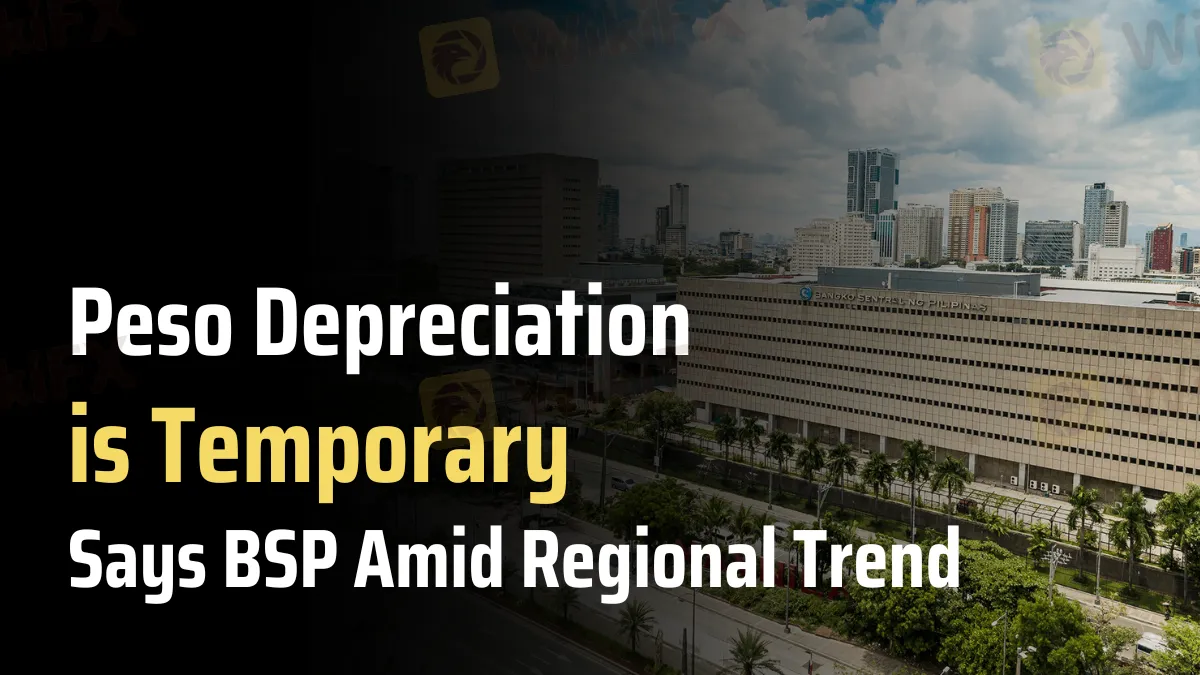简体中文
繁體中文
English
Pусский
日本語
ภาษาไทย
Tiếng Việt
Bahasa Indonesia
Español
हिन्दी
Filippiiniläinen
Français
Deutsch
Português
Türkçe
한국어
العربية
Peso Depreciation is Temporary, Says BSP Amid Regional Trend
Abstract:The BSP assures the public that the Philippine Peso's recent depreciation is temporary, reflecting a regional trend of weakening currencies against the US dollar.

In Manila, the Bangko Sentral ng Pilipinas (BSP) has reassured the public that the recent depreciation of the Philippine Peso (PH Peso) is just transitory, citing a larger regional trend of currencies falling versus the US dollar. This declaration comes after the peso fell to P58.27 to the dollar last week, the lowest level since November 2022.

During the Philippine Economic Briefing, BSP Senior Assistant Governor Iluminada Sicat addressed concerns, noting that the present depreciation is affected by external forces and would stabilize once these difficulties have been handled. Sicat indicated that this is merely a temporary situation. Once things settle down, the exchange rate will be determined by the fundamentals.
Sicat highlighted the regional context, saying, “We also look at what's going on in the neighborhood. Are we the only ones deteriorating or not?” This shows the BSP's view that the peso's fluctuation is part of a bigger trend impacting many currencies.
Despite the peso's dip to P58.27 on May 21, Sicat said that the government does not aim for a set exchange rate level, allowing market forces to define the rate. She did, however, emphasize the significance of monitoring market strains to avoid inflation expectations from increasing.

Ragnar Gudmundsson, the IMF's resident representative in the Philippines, agreed with this viewpoint, highlighting the significance of central banks making data-driven judgments. “Foreign exchange flexibility should be a priority,” he added, adding that combining it with a realistic inflation targeting framework is critical for investor confidence.
Gudmundsson said that despite possible concerns from global tensions and local wage demands, Philippine trends are mainly encouraging. He emphasized the need of addressing volatility induced by changes in the policies of the United States Federal Reserve. One of the recommended remedies is a combination of monetary and non-monetary measures, such as importing cheaper food goods to help needy families deal with high food costs.
The BSP's strategy is consistent with these guidelines, concentrating on preserving price stability while controlling market expectations. “We have to hold the line on that front... with a continued commitment to price stability,” said Gudmundsson.
Overall, the BSP and IMF announcements seek to reassure the public and investors that the present devaluation of the Philippine Peso is a transitory occurrence affected by larger regional dynamics and foreign causes. The BSP's commitment to market-driven exchange rates and price stability is central to its policy in this era of currency volatility.
Also, access the latest news here.

Disclaimer:
The views in this article only represent the author's personal views, and do not constitute investment advice on this platform. This platform does not guarantee the accuracy, completeness and timeliness of the information in the article, and will not be liable for any loss caused by the use of or reliance on the information in the article.
Read more

Anti-Scam Groups Urge Tougher Action on Fraudsters in UK
Anti-scam groups demand tougher police action on fraudsters as UK fraud rates surge 19%, targeting millions in a penalty-free crime spree exposed by a $35m scam leak.

Philippines Deports 29 Indonesians Linked to Online Scam Syndicate in Manila
Online scam groups in the Philippines trick Filipinos into gambling and love scams, from Manila to Bacolod, causing trafficking and pain as police fight back.

Why does your mood hinder you from getting the maximum return from an investment?
Investment decisions are rarely made in a vacuum. Aside from the objective data and market trends, our emotions—and our overall mood—play a crucial role in shaping our financial outcomes. Whether you’re feeling overconfident after a win or anxious after a loss, these emotional states can skew your decision-making process, ultimately affecting your investment returns.

How Reliable Are AI Forex Trading Signals From Regulated Brokers?
Discover how reliable AI Forex trading signals are and why using a regulated broker boosts their effectiveness. Learn key factors to evaluate accuracy and enhance your trading.
WikiFX Broker
Latest News
How Crypto Trading Transforms FX and CFD Brokerage Industry
FCA Warns Against 10 Unlicensed or Clone Firms
CySEC Warns Against 14 Unlicensed Investment Websites
Top Currency Pairs to Watch for Profit This Week - March 31, 2025
Will natural disasters have an impact on the forex market?
Philippines Deports 29 Indonesians Linked to Online Scam Syndicate in Manila
Exposed: Deceptive World of Fake Trading Gurus – Don’t Get Fooled!
AI-Powered Strategies to Improve Profits in Forex Trading
Stock Market Trading Volume Drops by 97.58 Billion Naira This Month
Why does your mood hinder you from getting the maximum return from an investment?
Currency Calculator







